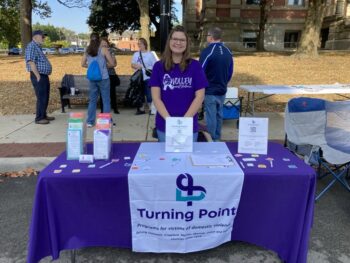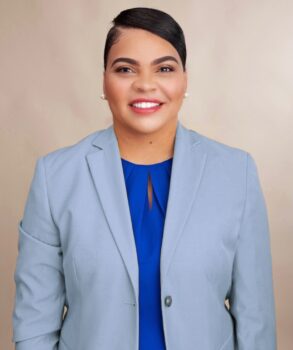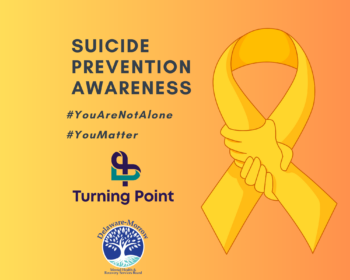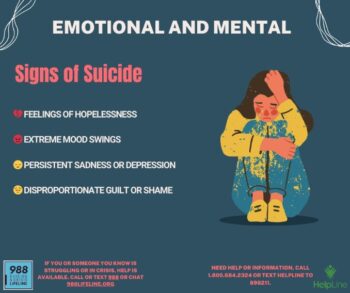
The Marion community has been profoundly affected by suicides over the past several months. In response, local leaders took action and raise awareness during September which is Suicide Awareness Month.
Vicki Kimmel, president of the Turning Point Board of Directors, expressed her deep concern, saying, “I’ve been asking myself, what else can we do? How can we reach those struggling in our community before it’s too late?”

Turning Point has helped survivors of domestic violence and human trafficking for 45 years. Survivors of childhood abuse and domestic violence are at a higher risk for suicide.
Abuse Increases Risk for Suicide
DomesticShelters.org states that up to 23% of domestic violence survivors have attempted suicide.
After discussions with Amber Scott, the president and CEO of Turning Point, the Board decided to “flood the airwaves” with messages of hope and help. Their campaign aims to ensure that resources are accessible to everyone in the community, from all walks of life.

“Our goal is for every single person to know how to get help, no matter where they live or what age they are,” Kimmel emphasized. The initiative seeks to remove barriers and connect those in need with life-saving support.
Scott states, “Our goal is to prevent suicide risks, provide treatment connections, promote recovery with the support of professionals and loved ones and to bring about continued awareness in order to shed light on the ways to both support a person dealing with suicidal ideation and the local and national resources available.”
Scope of the Problem in Ohio and Marion County
Five Ohioans die each day by suicide. Marion County has one of the highest rates of suicide, according to the Ohio Department of Public Health (ODPH) Public Health Data Warehouse. Rates have increased for all ages since 2007.
White Ohioans die by suicide at the highest rate, according to the ODPH. Men and those between the ages of 25 and 64 are at the highest risk, though it affects all races and age groups. In 2022, suicides involving a firearm accounted for more deaths than all other methods.
As this leading cause of death is preventable, many community partners are working to save lives.
“Suicide prevention and strategies to mitigate and support individuals with or without mental health diagnosis is a part of our on-going work and efforts. We currently work with Delaware Mental Health and Recovery Services Board, NAMI and the ADAMH Board to support our efforts in this space,” Scott says. “As you may know mental health and domestic violence often co-exists and so it is important for our agency to have programs, partnerships and strategies to support this need within our community.”

Signs of Suicide
Every community member can help in this effort.
According to the National Suicide Prevention Lifeline, these signs may be red flags that can indicate someone is at high risk of attempting suicide:
• Talking about wanting to die
• Feeling empty, hopeless or trapped
• Experiencing unbearable emotional or physical pain
• Talking about being a burden to others
• Withdrawing from family and friends
• Giving away important possessions
• Saying goodbye to friends and family
• Putting affairs in order, such as making a will
• Taking great risks that could lead to death, such as driving extremely fast
The Lifeline states that other serious warning signs include:
• Displaying extreme mood swings
• Making a plan to attempt suicide, such as stockpiling pills or buying a gun
• Talking about feeling great guilt or shame
• Using alcohol or drugs more often
• Acting anxious or agitated
• Changing eating or sleeping habits
• Showing rage or talking about seeking revenge

How to Help
The National Suicide Prevention Lifeline encourages people to ask someone directly, “Are you thinking about killing yourself?” People who are considering suicide often feel relieved that someone asks and cares about them.
Anyone experiencing suicidal thoughts or who is concerned about a loved one can call or text the Suicide Lifeline at 988. Find tips for helping someone else here.
Connecting to Turning Point
Turning Point supports individuals who are experiencing domestic violence.
If you know someone experiencing intimate partners violence, support is available through the agency’s 24-hour crisis line: 1-800-232-6505 or 740-382-8988.
Resources are also available at www.turningpoint6.org.
Follow Turning Point on (1) Facebook , Instagram or Twitter/X: @TurningPoint_6.
Additional community resources:
Crawford-Marion ADAMH – Providing Help. Offering Hope (mcadamh.com)
How The 5 Steps Can Help Someone Who is Suicidal – #BeThe1To
Resources – Ohio Suicide Prevention Foundation (ohiospf.org)
Related articles:
Survivor Supports Others Escaping Abuse with Turning Point Fundraisers | MarionMade
MarionMade! is a program of Marion Technical College.


















